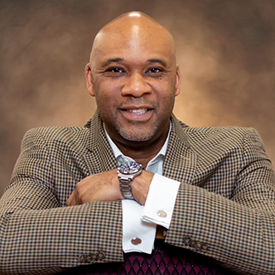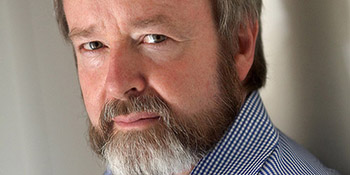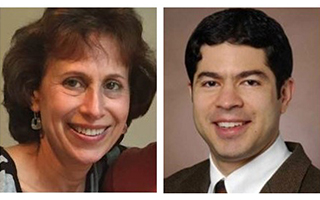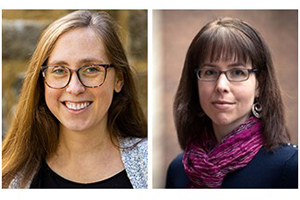Trent Humanities Lecture
20 Years Later: What Have We Learned from Hurricane Katrina
Environmental Disruptions of Communities in Need
Watch lecture recording.

Trent Humanities Lecture
Becoming A Vampire: Medical Education During An Era of Change
See lecture recording.
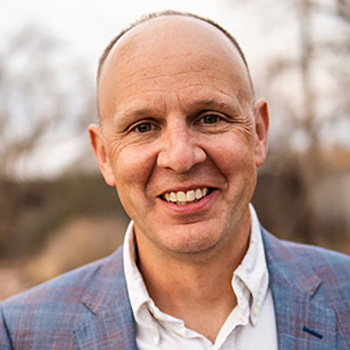
2025 Emerson Lecture
The Price of Saying No: Blowing the Whistle on Abuses in Medical Research
See lecture recording.
2025 McGovern Lecture
#HumanismAlways: Remembering the Person in Front of You
See lecture recording.
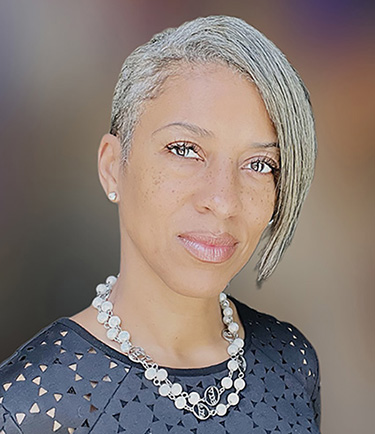
Trent Humanities Lecture
Neglected Contributions: The Activist Roots of American Bioethics
See lecture recording
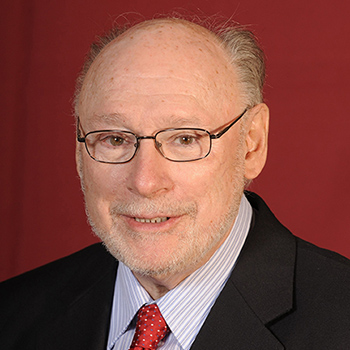
Trent Humanities Lecture
Where We Start Matters: A Womanist Reframing of Bioethics
See lecture recording
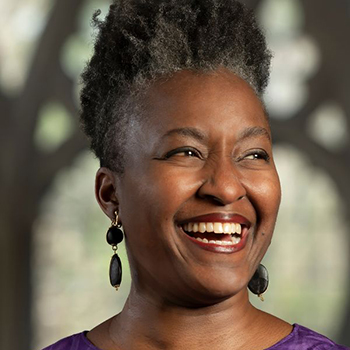
UNHEALED Podcast Launch & Lunch
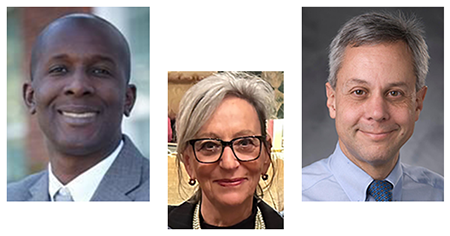
Trent Humanities Lecture
Jazz and Medical Ethics: Reflections from an Imperfect Art
Trent Humanities Lecture
Methods Matter! Engaging Bioethical Issues with Rigor
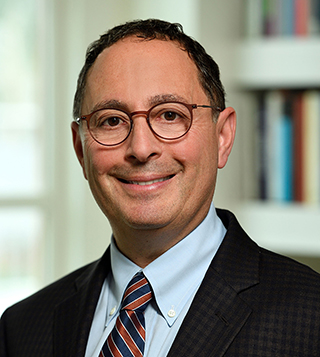
Trent Humanities Lecture
On the Swamp: Fighting for Indigenous Environmental Justice
See lecture recording
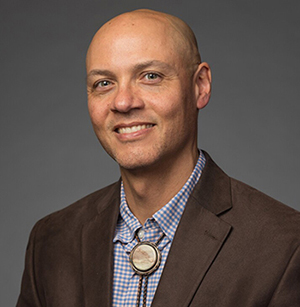
Trent Humanities Lecture
Fort Sumter and African-American Physicians: A Tale of Unintended Consequences
See lecture recording
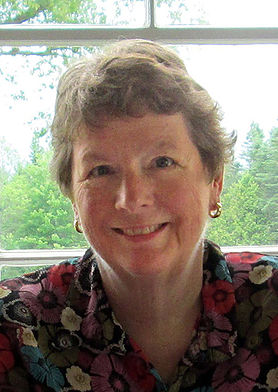
Trent Humanities Lecture
Facing the Unseen: The Struggle to Center Mental Health in Medicine
See lecture recording
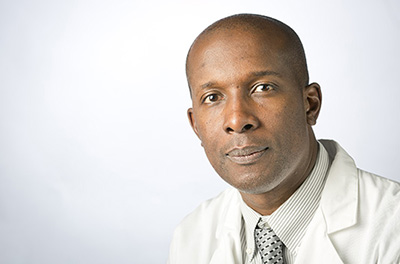
Trent Humanities Lecture
Distressed Medicine: COVID-19 and Healthcare's Futures
See lecture recording
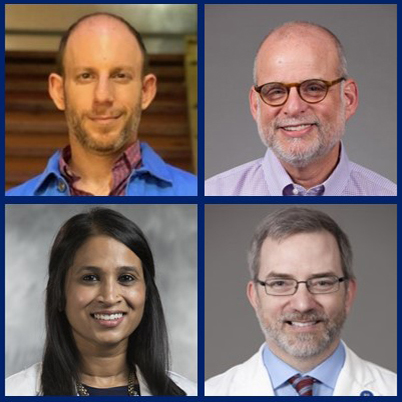
Research Team
Harris Solomon, PhD, MPH; Peter Kussin, MD; Neelima Navuluri, MD, MPH; Charles William Hargett, MD
Tuesday, April 9, 12:00-1:00pm
Great Hall, Trent Semans Center
Duke University
2024 McGovern Lecture
A Medicine More Fit for Humanity
See lecture recording
Iain McGilchrist
Psychatrist, neuroscience researcher, philosopher & literary scholar
Tuesday, April 2, 5:30pm
Great Hall, Trent Semans Center
Duke University
2024 Emerson Lecture
The Ethical Integration of Psychedelic-Assisted Therapy
See lecture recording
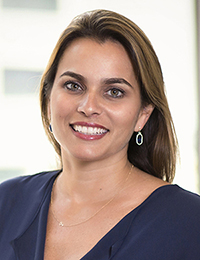
Amy McGuire, JD, PhD
Leon Jaworski Professor of Biomedical Ethics
Director, Center for Medical Ethics and Health Policy
Baylor College of Medicine
Thursday, February 22, 5:30pm
Great Hall, Trent Semans Center
Duke University
Trent Humanities in Medicine Lecture
Race and Place in the History of Psychiatric Diagnosis: Lessons from Southern Asylums During Segregation
See lecture recording
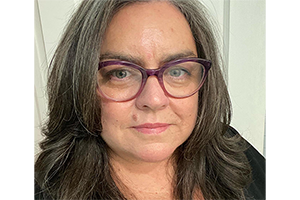
Kylie Smith, PhD
Department of History & School of Nursing
Emory University
Wednesday, January 24, 12:00-1:00pm
Duke Hospital Lecture Hall 2002
Trent Humanities in Medicine Lecture
Remembering Maltheus Avery: Race, Medicine, and Duke Hospital in the Jim Crow Era
See lecture recording
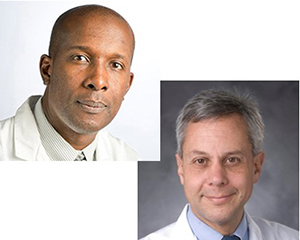
Damon Tweedy, MD
Professor of Psychiatry and Behavioral Sciences
Jeffrey Baker, MD, PhD
Director, Trent Center for Bioethics, Humanities & History of Medicine
Professor of Pediatrics and History
Wednesday, November 15, 12:00-1:00pm
Duke Hospital Lecture Hall 2002
Trent Humanities in Medicine Lecture
The Power of Human Connection: Caregiver Peer Mentoring in Chronic Illness
See lecture recording
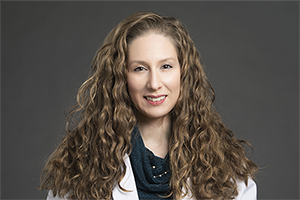
Jori Fleisher, MD
Associate Professor of Neurological Sciences
Rush University
Wednesday, October 4, 12:00-1:00pm
Room 4067 Trent Semans Center
2023 Boyarsky Lecture
Examining Slavery, the Archives of the Womb & the Birth of American Modern Gynecology
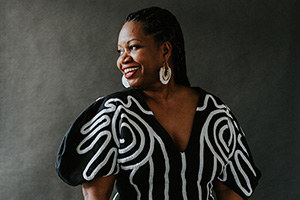
Deirdre Cooper Owens, PhD
Associate Professor of History & Africana Studies
University of Connecticut
Wednesday, September 20, 5:30pm
Love Auditorium, Levine Science Research Center
Duke University
Trent Humanities in Medicine Lecture
Journeys End, Journeys Begin: A Story of Accompaniment in Complex Grief
a conversation between Alison Hartman and Shapir Rosenberg, MD
Thursday, April 27, 2023, 5:30-7:00pm
Great Hall, Trent Semans Center
See a recording of the event (Duke NetID and password required for access)
2023 McGovern Lecture
Ending the Legacy of Medical Violence: Centering Black Women’s Resistance
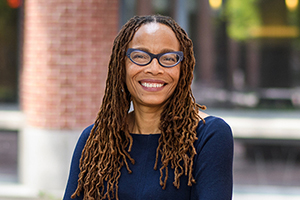
Dorothy E. Roberts
George A. Weiss University Professor of Law and Sociology
University of Pennsylvania
Tuesday, March 28, 2023, 5:45pm
Nasher Museum of Art, Duke University
See a recording of the lecture.
Only Mostly Dead? The Evolving Ethical Evaluation of Death by Neurologic Criteria
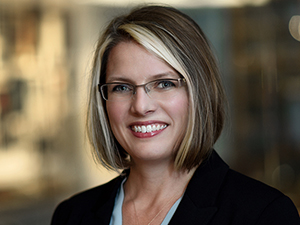
Tuesday, March 21, 2023 - 12:00-1:00pm
Duke Hospital Lecture Hall 2002
Janet Malek, PhD
Associate Professor, Center for Medical Ethics and Health Policy, Baylor College of Medicine
Visiting Associate Professor, Duke Science & Society Initiative
Professor Malek explored the ethical issues raised by recent challenges to the concept of death by neurologic criteria (DNC - aka "brain death"). After offering a brief history of the debate over DNC, she used cases to analyze questions about whether consent is required to test for DNC, when organ donation is permissible, and how to respond when patients or clinicians reject the concept of DNC.
See a recording of this event.
Trust Science? Political and Religious Polarization as a Public Health Problem
Thursday, February 16, 2023 - 5:30-7:00pm
Great Hall, Trent Semans Center
Emma Green
Journalist/writer, The New Yorker
Molly Worthen
Historian and journalist, UNC - Chapel Hill; The New York Times
In a moderated discussion, journalist Emma Green (New Yorker) and historian and journalist Molly Worthen (UNC, New York Times) considered how today’s religious and political polarization is a public health problem and ways that clinicians, health systems, and public health officials can respond. They helped us to understand the dynamics of the polarization, to envision ways that clinicians and health systems can work to build trust and to be trustworthy, and to explore ways of speaking and listening that lead to shared commitment to the health of our neighbors and to the common good.
See a recording of the lecture.
A History of Present Illness
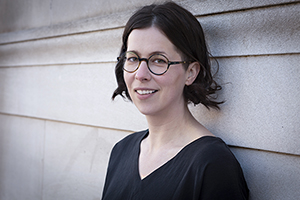
Wednesday, January 25, 2023 - 12:00-1:00pm
Duke Hospital Lecture Hall 2002 and on Zoom
Anna DeForest, MD
Palliative Care Physician and Novelist, Memorial Sloan Kettering Cancer Center
Palliative care physician and novelist Anna DeForest discussed the role of attention in clinical work, and ways of being present for the experience of others that allow us to find meaning and fulfillment in the face of great suffering, both physical and existential.
See a recording of the event.
The Gender of Care: Alzheimer's Disease in the 1980s
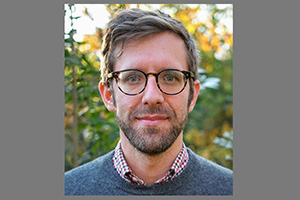
Wednesday, November 30, 2022 - 12:00-1:00pm
Zoom Webinar
Humanities in Medicine Lecture
James Chappel, PhD
Gilhuly Family Associate Professor of History, Duke University
In the 1980s, Americans grappled like never before with dementia, and specifically with Alzheimer’s Disease. This talk will return to this era with a historian’s eyes, asking specifically why families, and women in families, were viewed as the indispensable deliverers of care.
See a recording of the lecture.
One Vacant Chair: Remembering Children
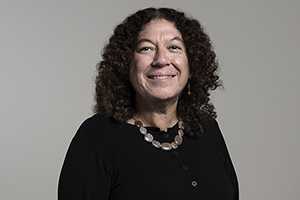
Tuesday, November 1, 2022 - 5:30-6:30pm
Great Hall, Trent Semans Center for Health Education
Humanities in Medicine Lecture
Perri Klass, MD, Physician & Author
Professor of Journalism and Pediatrics, New York University
This talk looked back at the "lost world," not so far away chronologically, of childhood mortality rates so high that they touched almost every family, and consider children's illness and death in art and literature, examining the narrative reflections of a world in which all people lived with the possibility of losing children.
PUSHING COOL: Big Tobacco, Racial Marketing, and the Untold Story of the Menthol Cigarette
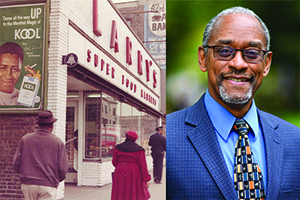
McGovern Lecture
Keith Wailoo, PhD gave the 2022 McGovern Lecture, Pushing Cool: Big Tobacco, Racial Marketing, and the Untold Story of the Menthol Cigarette, Tuesday, September 20, 5:45pm at the Nasher Musuem of Art.
What's the Story? Exploring the What, Why and How of Narrative Medicine

Friday, September 16, 2022, 8:00am-1:00pm
Keynote by Rita Charon, MD, PhD, Professor and Founding Chair, Department of Medical Humanities and Ethics, Professor of Medicine, Columbia University
This workshop offers an in-depth exploration of narrative medicine and its relevance to caring for our patients and ourselves. What is it? Why is it essential to good clinical practice, and how can we use it to reduce moral injury and address critical issues raised during the past two years? We all have stories that we carry with us, as patients and clinicians—as humans. The practice of narrative medicine has been shown to improve not only patient and clinician satisfaction, but patient outcomes as well by building community across disciplines.
The Song of our Scars: The Untold Story of Pain
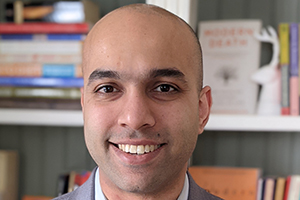
Humanities in Medicine Lecture
Inspired by his own experience with chronic back pain, in The Song of Our Scars – The Untold Story of Pain, Dr. Warraich explores the very nature of pain, the profound racial and gender disparities in how we attend to and alleviate it, and how the entire medical profession was complicit in the opioid epidemic. At a time when COVID-19 is igniting the crisis of chronic pain, he advocates for a new approach towards people in extremis.
Annual School of Medicine Faculty Awards Ceremony
On May 10, John Moses, MD received the 2022 Leonard Tow Humanism in Medicine Award.
Playing Between the Lines: Poetry by a Pediatrician
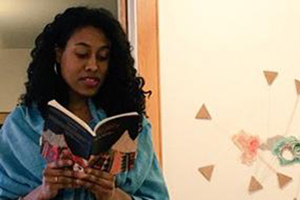
Humanities in Medicine Lecture
Irène P. Mathieu, MD, Assistant Professor of Pediatrics, Assistant Director, Program in Health Humanities, University of Virginia
How do creative writing and reading - specifically poetry - open up a space for clinicians to play with language? How might this "playtime" help us tackle burnout, compassion fatigue, and even health equity? Award-winning poet and pediatrician Dr. Irène Mathieu reads her latest work and discusses these questions and more.
See a recording of the event.
Drug Development and Access: Justice Challenges During the Pandemic and Beyond
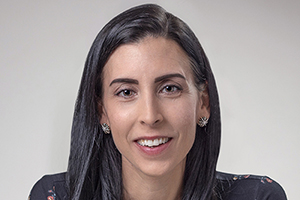
Boyarsky Series on Bioethics & Social Justice
Unprecedented resources, collaboration, and regulatory flexibility resulted in the rapid development and authorization of several prophylactic and therapeutic options for COVID‐19. However, we have faced important justice challenges in making those options fairly available during the pandemic – and we face additional justice challenges in determining which other disease areas should get this sort of special attention, as well as how best to balance the interests of current and future patients. This lecture addresses these justice challenges through the lenses of bioethics and health policy.
See a recording of the event.
See also a paper by Professor Fernandez Lynch.
Kidney to Share: A Living Kidney Donor's Experience and Lessons Learned
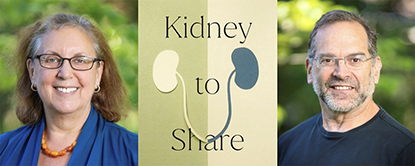
Humanities in Medicine Lecture
Martha Gershun and John D. Lantos, MD
In 2018, Martha Gershun donated a kidney at the Mayo Clinic to a woman she read about in the newspaper. In this talk, Ms.Gershun will discuss her decision to donate a kidney to a stranger and the long, complicated process that finally led to a successful surgery nine months later. Dr. John Lantos, physician and bioethicist, will use her story to illustrate the ethical issues that arise in recovering and allocating organs from both living and deceased donors. They will suggest ways that the medical community could thoughtfully and safely reduce the burdens on living donors. Doing so could shorten the waiting list for transplants and save lives.
See a recording of the event.
Respecting Autonomy and Enabling Diversity: The Critical Need for Demographic Variation in Research Datasets
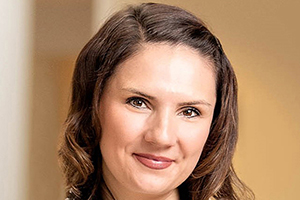
Kayte Spector-Bagdady, JD, MBioethics, Associate Director, Center for Bioethics & Social Sciences in Medicine, Assistant Professor, Department of Obstetrics & Gynecology, University of Michigan Medical School
Professor Kayte Spector-Bagdady discusses different theoretical as well as recruitment and consent approaches to improve data collection and sharing practices in ways that are both respectful of individual patient autonomy and equitable in impact across diverse communities.
See a recording of the event.
The Problem of Alzheimer's: How It Became a Crisis & What We Can Do About It
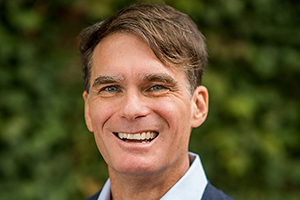
Boyarsky Lecture on Bioethics & Social Justice
Jason Karlawish, MD, Professor of Medicine, Medical Ethics and Health Policy, University of Pennsylvania
From its beginning as a rare disease, Alzheimer’s quite From its beginnings as a rare disease, Alzheimer’s quite quickly became a common disease and then turned into a crisis. The stories of how these events happened are a tangled weave of science, culture, and politics, sometimes in harmony, often in conflict.quickly became a common disease and then turned into a crisis. The stories of how these events happened are a tangled weave of science, culture, and politics, sometimes in harmony, often in conflict.
See a recording of the event.
Responsible Conduct of Research Short Course
The Fall 2021 Responsible Conduct of Research (RCR) course was held on Tuesdays, August 31-September 28, 8:00-9:45am.
Fifth Annual SCOPES Medicine and Art Exhibition

The 2021 SCOPES Art Exhibition: A Multi-Media Reflection on Chronic Illness took place on August 3.
From August 4 - September 30, the art from the exhibition was displayed in the Mars Gallery in the Duke University Hospital Concourse. The 2021 SCOPES virtual exhibition is online at https://sites.duke.edu/scopes/.
Aaron McDuffie Moore, MD: The Story of Durham's First Black Physician and Founder of Lincoln Hospital
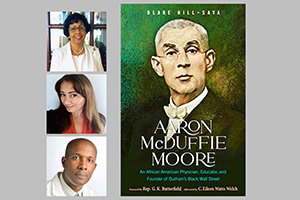
This event is a conversation about the impact of the life of Dr. Aaron McDuffie Moore (1863-1923) on the health of Durham’s Black residents. Panelists discuss his role as a pioneering physician, educator, and driving force behind the establishment of Lincoln Hospital, the first secular, freestanding African American hospital in North Carolina. They also explore Dr. Moore’s legacy for our current times.
See a recording of the event.
Narrative Medicine: A Patient's Perspective
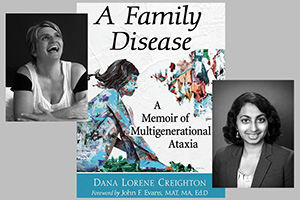
Humanities in Medicine Lecture
In 2006, Dana Creighton was diagnosed with spinocerebellar ataxia, an inherited neurological condition that also took the lives of her mother and several family members. Fifteen years later, she has published a powerful new memoir, A Family Disease: A Memoir of Multigenerational Ataxia, drawing on research in neuroplasticity, personal memories, and medical records to highlight how the stories we tell about illness can create meaning out of trauma. Following a reading from her memoir, Ms. Creighton and her neurologist, Dr. Sneha Mantri, join in conversation.
See a recording of the event.
Climate Change Series: Finding Our Roots and Looking to Our Future
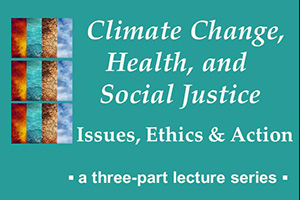
Nature's Guardians: What Indigenous Voices Can Teach Us
Lori Byron, MD, St. Vincent Healthcare, Billings, MT
Robert Byron, MD, MPH, Bighorn Valley Health Center, Hardin, MT
The Climate Crisis and Pregnancy
Bruce Bekkar, MD, Women's health physician, author, and educator
Nathaniel DeNicola, MD, MSHP, Caduceous Medical Group
This event is the third in a three-part series of lectures on Climate Change, Health, and Social Justice: Issues, Ethics, and Action. See more information on the series and recordings of previous sessions.
Climate Change Series: Structures and Systems - From Geography to the Workplace
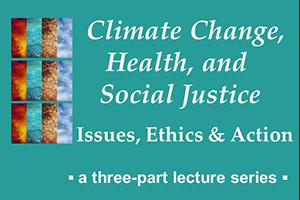
The Geography of Environmental Inequality
Jeremy Hoffman, PhD, Science Museum of Virginia, Richmond, VA
Healthcare Delivery in the Climate Crisis
Emily Senay, MD, MPH, Icahn School of Medicine at Mount Sinai, New York City, NY
Existing structures and systems deeply impact the intersectional relationship between climate change, health, and social justice. What are these factors? What issues must be recognized and acknowledged? What must we understand and how should we respond?
This event is the second in a three-part series of lectures on Climate Change, Health, and Social Justice: Issues, Ethics, and Action. See more information on the series and recordings of previous sessions.
From Planet to Patient: Understanding Connections, Issues, and Action
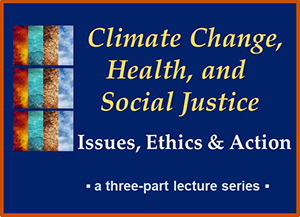
Connecting Planetary Health and Human Health... Ethically
Howard Frumkin, MD, DrPH, University of Washington School of Public Health
Opportunities for Clinical Action at the Intersection of Climate Change and Health Equity
Aparna Bole, MD, Case Western Reserve School of Medicine
From the big picture perspective of a changing planet, moving to a lens on the human and individual level, Drs. Howard Frumkin and Aparna Bole collaboratively discuss the complex interconnections between planetary health and human health. What are the far-reaching impacts of climate change on health? What are the ethical considerations? What are the implications for patients and clinicians? And what are our opportunities and responsibilities for action?
This event is the first in a three-part series of lectures on Climate Change, Health, and Social Justice: Issues, Ethics, and Action. See more information on the series and recordings of previous sessions.
Remembering a 1979 Moral Moment: Medical Activists, Racial Justice, and Confronting the KKK
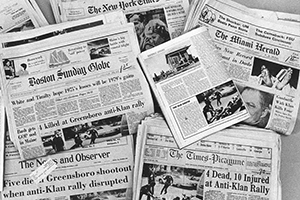
Tuesday, December 15, 2020 - 5:30pm to 6:45pm
Webinar
Boyarsky Series on Race & Health - Panel Discussion
Following a segment from a recent film about what became known as the 1979 Greensboro Massacre, survivors share why this story is worth remembering, and why it remains relevant to health and racial justice activism today.
See a recording of the event.
Race and Reproduction: Eugenic Sterilization Revisited
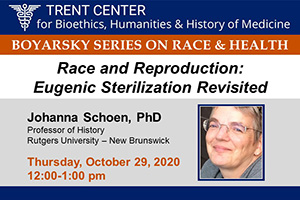
Boyarsky Series on Race & Health
This talk in the Boyarsky Series on Race & Health analyzes the history of North Carolina’s eugenic sterilization program which operated from 1929-1975 and authorized the sterilization of more than 7,000 people.
See a recording of the talk.
Keepers of the House: Documentary Screening and Discussion
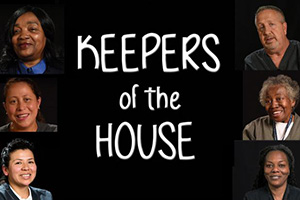
Humanities in Medicine Lecture
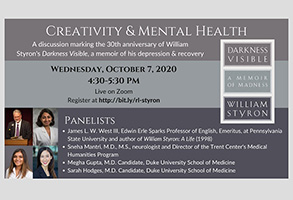
Wednesday, October 7, 2020 - 4:30pm to 5:30pm
A discussion marking the 30th anniversary of William Styron's Darkness Visible, a memoir of his depression & recovery.
Duke Hospital's History: A Conversation about Race and Memory
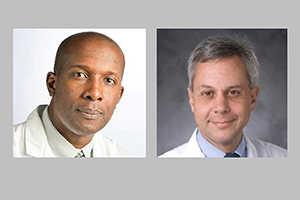
Special Event
From 1930 to the 1960s, Duke hospital’s wards were segregated by race. Did people of color truly receive “separate but equal” care? In what ways did the civil rights movement successfully challenge these inequities? Did the racism associated with the Jim Crow era collapse, or re-appear in new forms?
See a recording of the talk.
Fourth Annual SCOPES Medicine and Art Exhibition
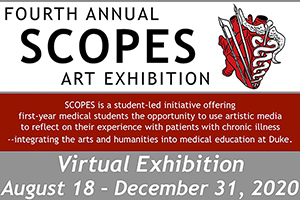
Visit the 2020 SCOPES Art Exhibition here.
Research Unbound: Seeking Ethical Solutions to New (and Old) Problems
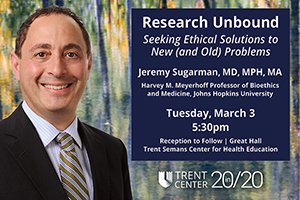
Endowed Lectureships
Recent controversies such as the birth of the first gene-edited babies in China, unchecked uses of unproven stem cell-based therapies, clinical trials conducted without patient consent, and HIV research with vulnerable populations challenge existing approaches aimed at ensuring that research is ethically sound. New and creative solutions are needed to appropriately manage research that seems to be unbound.
The Ethics of Automating Informed Consent: A Comparative Study
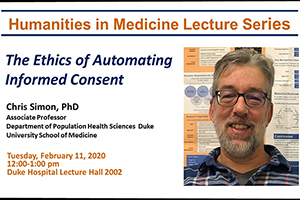
Humanities in Medicine Lecture
Informed consent has entered the digital age. Automated consent processes are replacing face-to-face (F2F) discussions of research. Is this a good thing? For whom? How do we advance the ethical and legal integrity of consent processes as the emphasis shifts to technological efficiency? Professor Simon addresses these questions with the support of fresh data from a multisite randomized trial comparing electronic and F2F consent processes for genomic biobanks.
See recording of Chris Simon's talk.
Frozen In The Toilet Paper Aisle of Life
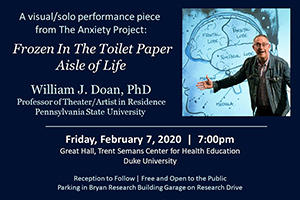
Special Event
A part of The Anxiety Project, Frozen In The Toilet Paper Aisle Of Life combines stories and drawings in a very personal and in depth look at the complex ways we understand anxiety and depression.
CANCELED - Smallpox Eradication 40 Years On: An Alternative Commemoration
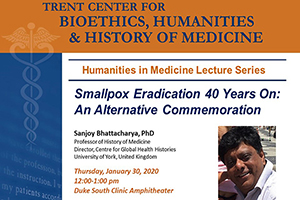
Humanities in Medicine Lecture
CANCELED
due to travel complications from UK
An effective vaccine caused health officials around the world to start dreaming about the prospect of smallpox eradication. In the mid-1960s, a series of US Centers for Disease Control (CDC) and USAID- supported pilot programs in western and central Africa proved the efficacy of the freeze-dried vaccine and provided the strategic template for worldwide smallpox eradication. But was it really all so simple?
Could Poetry Save Doctoring?
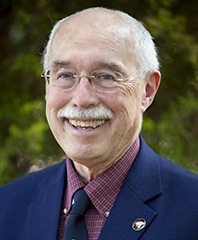
Humanities in Medicine Lecture
Francis A. Neelon, MD, Associate Professor Emeritus of Medicine, Duke University School of Medicine
"Doctoring"-- the therapeutic interaction of health professionals with patients -- has two components: 1) transferring information; 2) establishing a healing relationship. Today, over-reliance on information transfer imperils the fragile balance of these components....
See recording of Frank Neelon's talk.
Opening Reception: Exhibition Documenting Durham's Health History
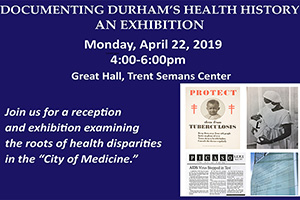
Special Event
How have racial health disparities in Durham been understood over the past century? To what extent have their structural roots been appreciated? What role has Duke Health played in this history?
Race, Medical Research, and Reparations
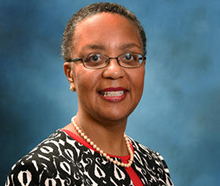
Humanities in Medicine Lecture
What is the moral aim of medical research in the context of race-based health inequity and health disparity? The history of race in medical research is fraught with misinformation, deceit, and disproportionate suffering and burden-bearing.
Sans Frontières: What Border-Crossing in Mohsin Hamid’s Exit West Can Teach Us About Medical Practice
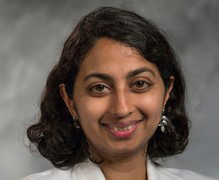
Humanities in Medicine Lecture
In this talk, Sneha Mantri shows how a novel featuring no doctors at all contains essential truths for medical education, training, and practice.
See recording of Sneha Mantri's talk.

Poetic Survival: Painting the Fire as it Burns Us
Joey Lew, MD, MFA
to

Do True: Boundary Spanning to Impact in Climate and Health
Jessica Castner, PhD, RN-BC, FAEN, FAAN
to

Becoming A Vampire: Medical Education During An Era of Change
Abraham Nussbaum, MD
to

The Price of Saying No: Blowing the Whistle on Abuses in Medical Research
Carl Elliott, MD, PhD, Professor, Department of Philosophy, University of Minnesota
to
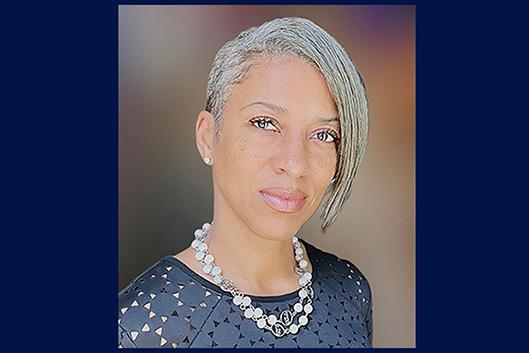
#HumanismAlways: Remembering the Person in Front of You
Kimberly D. Manning, MD, Professor of Medicine and Vice Chair, RYSE Diversity, Equity, and Inclusions Initiatives at Emory University Department of Medicine
to
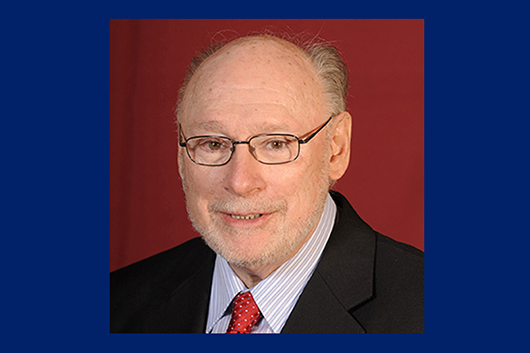
Neglected Contributions: The Activist Roots of American Bioethics
Robert Baker, PhD
to
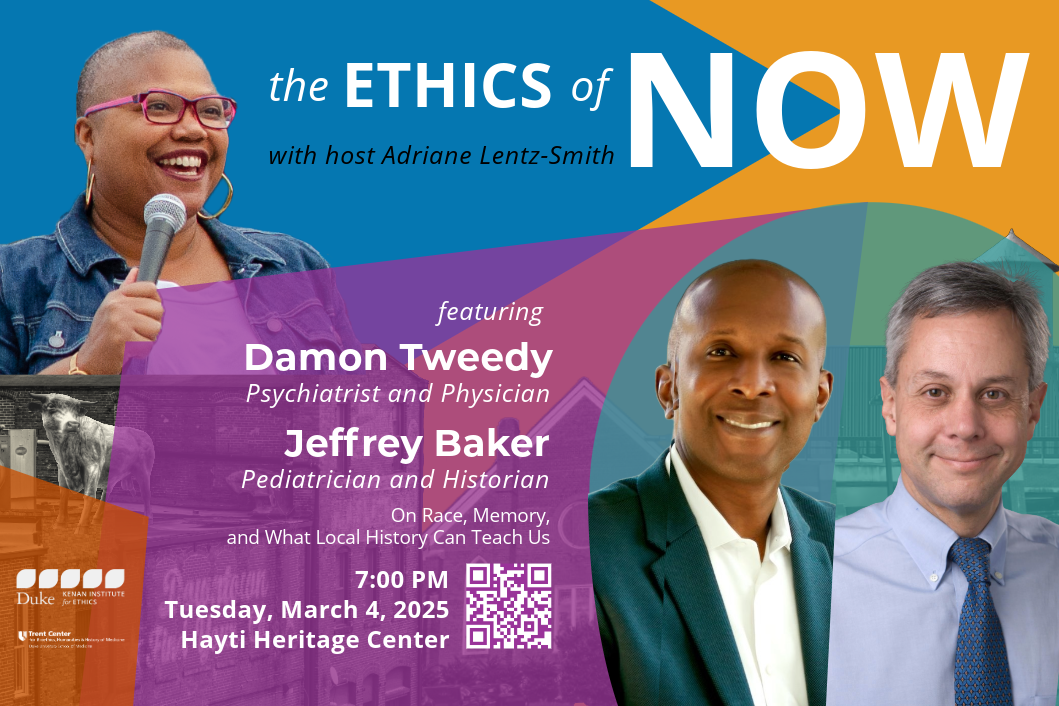
The Ethics of Now with Damon Tweedy and Jeffrey Baker
Adriane Lentz-Smith, Damon Tweedy, and Jeffrey Baker
to

